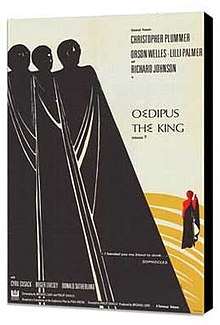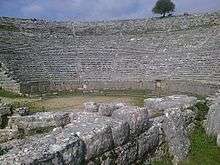Oedipus the King (1968 film)
| Oedipus the King | |
|---|---|
 | |
| Directed by | Philip Saville |
| Produced by |
Timothy Burrill Michael Luke |
| Written by |
Sophocles Michael Luke Philip Saville |
| Starring |
Christopher Plummer Lilli Palmer Orson Welles Richard Johnson |
| Music by | Yiannis Hristou (as Jani Christou) |
| Cinematography | Walter Lassally |
Production company |
Crossroads World Film Services, Universal Pictures |
Release date | 1967 |
Running time | 97 minutes |
| Country | United Kingdom |
| Language | English |
Oedipus the King is a 1967 film directed by Philip Saville based on the Athenian tragedy Oedipus Rex by Sophocles. The film boasts an all-star cast, including Christopher Plummer as Oedipus, Lilli Palmer as Jocasta, Orson Welles as Tiresias, Richard Johnson as Creon, Roger Livesey as the Shepherd and Donald Sutherland as the leading member of the Chorus.[1][2] Sutherland's voice, however, was dubbed by another actor. Filmed in Greece at a ruined Greek theatre in Dodoni,[3] it was not seen in Europe and the U.S. until the 1970s and '80s after legal release and distribution rights were granted to video and TV and was considered a rare film.
Saville's first theatrical effort, the film remained theatrical in nature, and is known for its intensive dialogue typical of an ancient play.[4][5] However, the film went a step further than the play, by actually showing, in flashback, the murder of Laius (Friedrich Ledebur). It also showed Oedipus and Jocasta in bed together, making love.
Cast
- Christopher Plummer as Oedipus
- Lilli Palmer is Jocasta
- Richard Johnson as Creon
- Orson Welles as Tiresias
- Cyril Cusack as Messenger
- Roger Livesey as Shepherd
- Donald Sutherland as Chorus Leader
- Friedrich von Ledebur as King Laius
- Dimos Starenios as Priest
- Alexis Mann as Palace Official
- Oenone Luke as Antigone
- Cressida Luke as Xemene
- Minos Argyrakis as Chorus
- Manos Destounis as Chorus
- George Dialegmenos as Chorus
- Valentine Dyall as Chorus Leader (voice)
Reception

Despite its calibre of actors, the film was not universally well received. New York Magazine described it as "almost comical" in a September 1968 review;[6] a 1972 review said "An elaborate production, overly academic and without much force or cinematic merit."[3] However, in 1968 the Illustrated London News praised its "cinematic fluidity"[7] and Jon Solomon in 2001 said that the film was "distinguished by intensity and fine acting", with Plummer's Oedipus boasting "an arrogant, strong-willed title character". However, Solomon also remarked that the film "would never have won first prize at an ancient Athenian contest.[8] Leonard Maltin in 2006 said that the "film version of Sophocles play is OK for students who have a test on it the next day, but others won't appreciate this version."[9] The script was originally based on Paul Roche's translation directly from the Greek done in the early 1950s. (Penguin USA OEDIPUS PLAYS/PAUL ROCHE).
References
- ↑ Gillespie, Sheena; Fonseca, Terezinha (8 November 2001). Literature Across Cultures. Addison-Wesley Longman, Limited. p. 38. ISBN 978-0-205-32698-3. Retrieved 5 October 2012.
- ↑ MacKinnon, Kenneth (1986). Greek Tragedy Into Film. Croom Helm. p. 66. ISBN 978-0-7099-4625-0. Retrieved 5 October 2012.
- 1 2 Sadoul, Georges (1 September 1972). Dictionary of Films. University of California Press. p. 256. ISBN 978-0-520-02152-5. Retrieved 5 October 2012.
- ↑ University of Southern California. Division of Cinema; American Film Institute; Center for Understanding Media (1968). Filmfacts. pp. 372–3. Retrieved 5 October 2012.
- ↑ Lazar, Moshe; Yaari, Nurit (2000). On interpretation in the arts: interdisciplinary studies in honor of Moshe Lazar. The Yolanda and David Katz Faculty of the Arts, Tel Aviv University. pp. 157–8. Retrieved 5 October 2012.
- ↑ New York Magazine. New York Media, LLC. 30 September 1968. p. 55. ISSN 0028-7369. Retrieved 5 October 2012.
- ↑ The Illustrated London news. The Illustrated London News & Sketch Ltd. 1968. Retrieved 5 October 2012.
- ↑ Solomon, Jon (8 February 2001). The Ancient World in the Cinema: Revised and Expanded Edition. Yale University Press. p. 261. ISBN 978-0-300-08337-8. Retrieved 5 October 2012.
- ↑ Maltin, Leonard (1998). Leonard Maltin's movie and video guide. Plume. p. 976. Retrieved 5 October 2012.